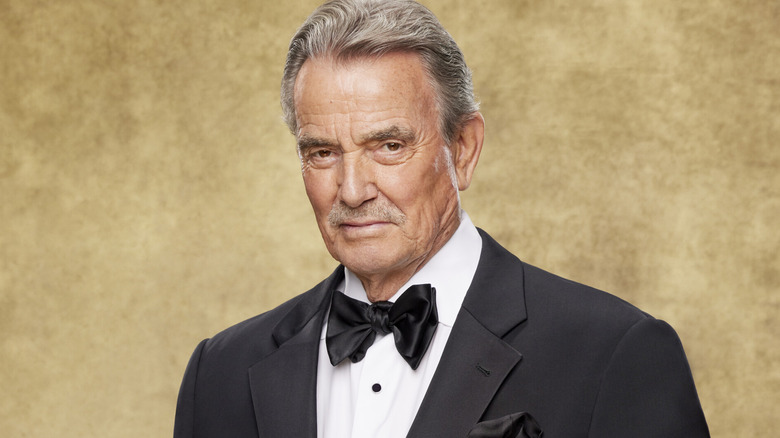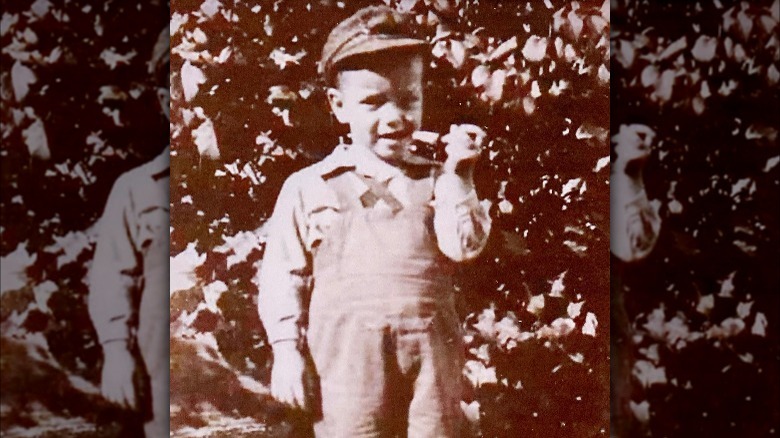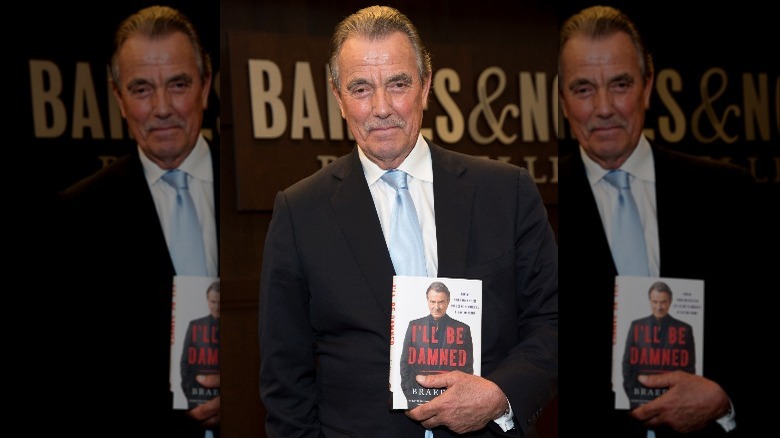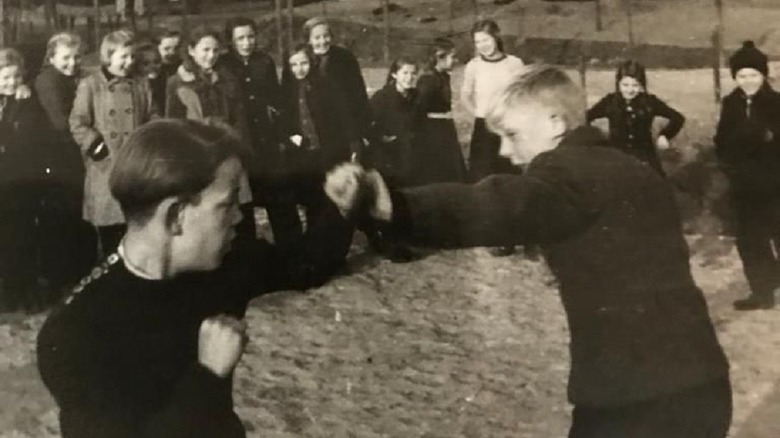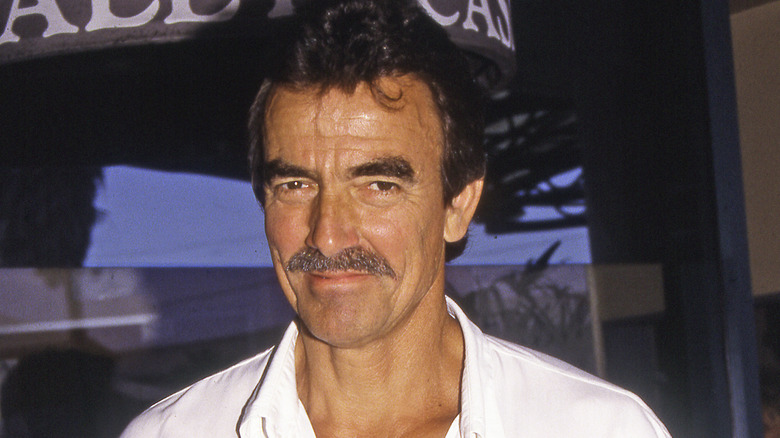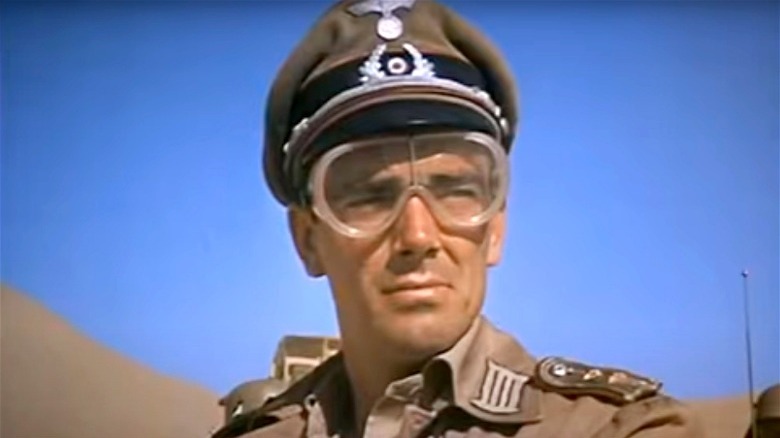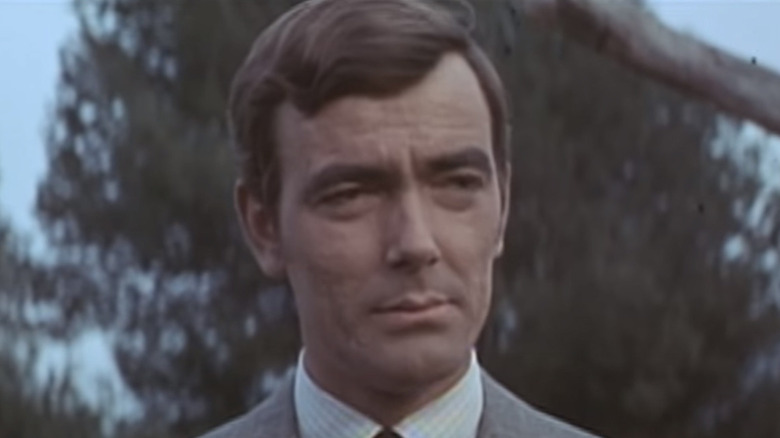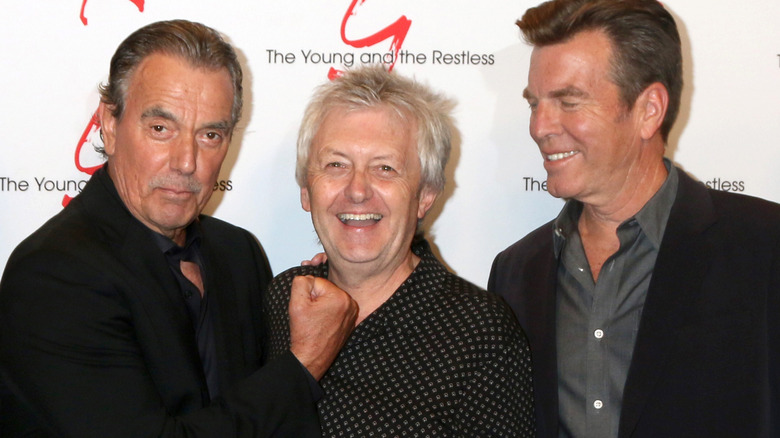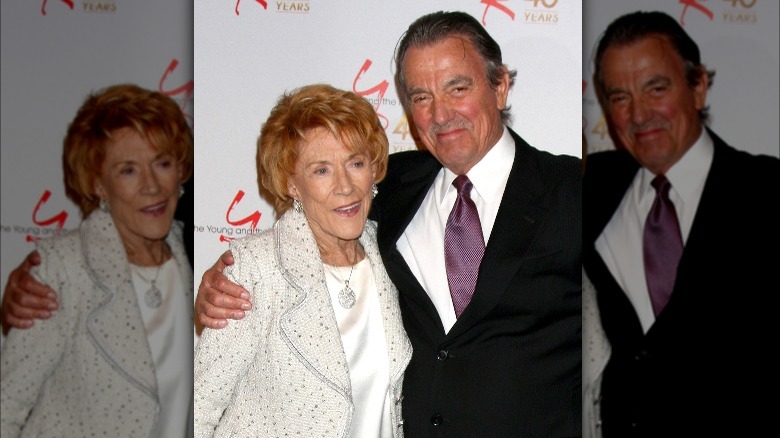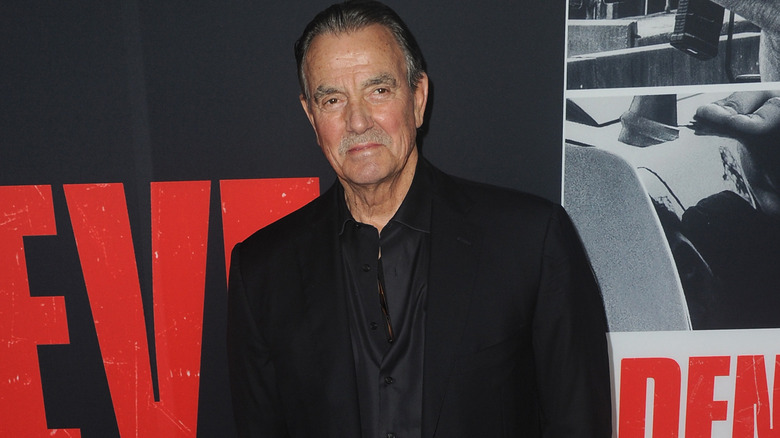Sad Details About Eric Braeden From The Young And The Restless
Eric Braeden may not have the riches of Genoa City-based billionaire Victor Newman, the character he's played for more than 40 years on the popular daytime drama "The Young and the Restless," but he's done well for himself nonetheless. And in real life, Braeden thankfully doesn't seem to display the same ruthlessness as his character, who's been married 12 times, 'killed off' on four occasions, and has thrown countless adversaries under the bus during the course of the soap. Yet Braeden's own backstory is far from ordinary, having been born Hans Gudagest in Germany during the height of the Second World War. His life as an infant and a toddler were jeopardized on several occasions in a town where mortar shells and bullets punctuated the hostile landscape.
Gudagest immigrated to the U.S. in 1959 where life was more prosperous, yet socially difficult given American animosity towards Germans at the time. But as an actor, his roots prompted Hollywood to cast him as a baddie in war and action dramas, stereotypes he'd eventually rail against. His career subsequently benefited when he reluctantly changed his name to Eric Braeden, while fearing that yet another connection to his native Germany would be lost. What he has retained, however, is a sense of integrity and a capacity to defend himself against anyone seeking to compromise his values. "I had a relatively hard life and don't take any [crap]," Braeden said to the Toronto Star. Here's a rundown of what he had to face and continues to deal with.
His hospital was bombed after he was born
Eric Braeden entered the world as Hans Gudagest April 3, 1941 in Kiel, Germany — and he literally arrived with a bang. Horrifically, those fireworks came from Soviet artillery bombarding Germany as Stalin's Red Army was taking on Hitler's Third Reich during one of the Second World War's most intense periods. It didn't help that Braeden was born to a well-off family in Bredenbek, where his father was also the mayor. Status wasn't enough to insulate themselves against tragedy. Conditions were so dangerous that the hospital where Braeden was born had been bombed the day after his mother was discharged. Braeden wasn't sure if the timing was luck or serendipity, but the incident planted a seed of fearlessness in his psyche. "Who can say?" asked Braeden to TV Insider. "But I do feel I grew up with a deep-seated belief that I could overcome anything. That was always a part of me."
Still, Braeden had every reason to be scared during the war, especially living near Kiel, where shipbuilding was the major industry and a feeder of vessels to the German Navy. To the toddler, the sights and sounds of conflict were everywhere. "I remember images of bomb attacks — the noise of planes approaching, bombs falling, and anti-aircraft shooting back," recalled Braeden to The Washington Post. "I remember clinging to whatever adult was close by in shelters. You would come out and find families crying, animals screaming." Unfortunately, things were about to get worse.
Eric Braeden was aboard a torpedoed ocean liner
By 1945, Hitler's stranglehold on Europe had weakened to a child-like grasp as the Soviets and Allied forces had begun retaliatory strikes on Germany. The intensity of the fighting forced the Gudagests and other terrified locals to flee the country via the ocean liner MV Wilhelm Gustloff. But hours after the ship left port, a Soviet sub torpedoed the Gustloff, killing an estimated 9,400 people in what turned out to be the deadliest single-ship disaster in naval history. "I hope this doesn't sound too dramatic," said novelist Ruta Sepetys — whose book "Salt to the Sea" was based on the tragedy — to Time."But what surprised me the most was that anyone survived." Miraculously, the Gudagests were among those who made it back to Germany alive, only to endure the hardships of the war, which ended later that spring.
For his part, Eric Braden mentioned the marine disaster in his memoirs, "I'll Be Damned: How My Young and Restless Life Led Me to America's #1 Daytime Drama," published in 2017. But he said his bigger recollections of life during wartime consisted of flashes of fireballs destroying the town, starving citizens digging for potatoes, and those scary moments in the Gudagest basement during air raids. "As a little boy, with nothing to compare them to, I wonder if I thought those horrors were normal, that they were part of what everyday life was like in this world," he wrote.
His family plummeted from wealth to poverty
As four-year-old Hans Gudagest, Eric Braeden finally experienced what peace was like. But the end of the Second World War got off on the wrong boot when a British officer arrested his father for his association with the Nazi Party, which the bewildered youngster didn't know at the time. It would be a year before his father would finally come back home.
Temporarily losing a family member wasn't the only disruption in the Gudagest household. The war also disrupted his father's construction business and the household quickly felt the pinch. "Within a few weeks, we didn't just see the end of our life of privilege, we plunged into utter poverty," wrote Braeden in "I'll Be Damned." "The Nazis had confiscated most of my father's trucks during the war. What trucks they didn't confiscate, the British did, when the war ended and they took over." The Gudagests wound up living in a small upstairs section of the home they once owned.
Even after the war ended, just playing outside was hazardous for children in Bredenbek, given that most of the bombed buildings and homes still contained some unexploded ordinances. Telling The Washington Post about kids who were killed when one of those devices detonated, he added, "After the war, we played in rubble." Still, despite the hardship, young Hans not only learned some valuable lessons, but he was also forced to grow up in a hurry.
At 12, Eric Braeden lost his father
Eric Braeden recalled the pain and bewilderment of losing his father to a heart attack. "It was an overwhelming number of changes for a 12-year-old to process, especially one who was still mourning the loss of the most important person in his life, with no clue how to make sense of it," he wrote in "I'll Be Damned." The tragedy not only changed his demeanor, but it also became a tool that helped him navigate his way through the power-tripping egos that dominate Hollywood. "When you lose your father at that age, you become defiant and angry and you resent authority or arbitrarily imposed authority," said Braeden on the podcast "State of Mind with Maurice Benard." "... I will not take s*** from anyone. And that has served me well over the years."
Braeden blamed the war, the humiliation of being arrested, and his father's loss of business as being the triggers for the cardiac arrest that killed him. But he was also shocked to discover why his father was arrested in the first place. It turned out he was a member of the Nazi Party, which was apparently common among Germans working in business and government – before the populace became aware of Hitler's monstrous agenda. "It was what one did," Braeden said to People. "But he was not a part of the atrocities. In fact, I found out my eldest brother was approached by the Hitler Youth and my father forbade him to join. So I have come to peace with all that."
He hated playing Nazi soldiers
Lured by Karl May novels which embellished American adventures, Eric Braeden felt the urge to cross the pond to see the country for himself in 1959. He found work cutting cadavers in a Galveston, Texas lab and even became a rancher in Montana. Eventually, he tried acting, where, against his better judgment, he often depicted Nazi soldiers in war dramas that included "Combat!" and "12 O'Clock High." "Hollywood obviously did a lot perpetuating that ... very stereotypical image, in some measure justified. I hated it," Braeden said to Fox News. "After a while I loathed it, but it was a way to start in the business,"
In 1966, he landed a huge role as German Capt. Hans Dietrich, who, for two seasons, battled a scrappy North Africa-based Allied squad in "The Rat Patrol." But he also fought producers who thought his portrayal was too compassionate — they wanted a more bloodthirsty version with an eye patch and a limp. "I said, 'Tell them to go f*** themselves, I won't do that," Braeden explained on the "Archive of American Television" podcast. Braeden won his dispute, later explaining the show missed the point. Most Germans conscripted into the war were initially seduced by Hitler's rebuilding of the country, which put food on their tables during the '30s. "That is why in Hollywood films where they show nothing but these caricature Nazis, they have contributed nothing to the understanding of that phenomenon," he added.
Eric Braeden was forced to lose his German name
Still known in Hollywood as Hans Gudagest, Eric Braeden may have reluctantly milked a German soldier cash cow, but it also meant his background shut him out of more diverse opportunities. According to his former "Young and the Restless" cohort Doug Davidson, Braeden was considered to play James Bond in the movie "On Her Majesty's Secret Service," a role George Lazenby eventually landed. "[Eric Braeden] was disqualified from playing the role because he didn't have a British passport," tweeted Davidson. Braeden's big chance came in 1970 when he was tapped to play the lead as a scientist in the movie "Colossus: The Forbin Project." The only problem was that he had to change his name.
Braeden didn't want to do that until his wife reminded him that legendary German actors like Maxmillan Schell had to settle for playing Nazis. and that he could get away from all that. "Changing my name was one of the most painful decisions I've ever made, so I needed to choose a name that I could still identify with," he told CBS. He came up with Eric, a rather common name in Northern Europe, and opted for Braeden, after his hometown of Bredenbek. It worked, as "Colossus" quickly opened a lot of doors. "When you suddenly star in a film, things change very quickly," Braeden said on the "Archive of American Television" podcast. "It's an uncanny feeling. A very disconcerting feeling. A very unbalancing feeling."
He fought with Y&R colleagues
After "Colossus," Eric Braeden managed to get more eclectic roles on TV in shows like "Charlie's Angels" and "Kojak," as well as movies like "Escape From the Planet of the Apes." His star took another upturn in 1980 when he accepted a gig to play Victor Newman in "The Young and the Restless," whose personality was every bit as brash as the actor portraying him. It was an attitude that got him into trouble on the set. Especially in 1991, when he allegedly got into an altercation with Peter Bergman, who played Jack Abbott, Newman's rival. "We just have different ways of approaching [the work], but we respect each other a lot," Braeden told Soap Opera Digest. "There was a time when I said to Peter, 'Look, we may not like each other, but we are both good for the show. This storyline that you and I have, this enmity between us, is good for the show. It makes for drama and conflict.'"
He had another altercation with an actor who tried to get Braeden fired, only to get himself canned. "He was a very good actor, but he's lucky he's walking in one piece," Braeden said to TV Insider. Braeden himself walked off "Y&R" in 2009 for refusing to take a pay cut, telling CNN, "This is a certain corporate culture now that is very deleterious." In January of the following year, he returned after making a few compromises in his contract.
Eric Braeden grieved Y&R colleagues who died
Like most veteran actors on the soap circuit, Eric Braeden has seen several colleagues come and go, the latter sometimes under the saddest of circumstances. One death that shook the actor emotionally was the 2013 death of Jeanne Cooper, who played corporate matriarch, Katherine Chancellor. When Braeden started on "The Young and the Restless," Cooper allegedly placed her hand on his crotch and said, "Let's see what you've got, macho man." Talking to TV Insider, Braeden responded, "When it happened, I called up ['Y&R' head writer] Bill Bell and said, 'Please, no romantic storylines with that one!'" Upon Cooper's passing, Braeden in a prepared statement to Soap Opera Network, said, "She was an absolute joy to work with. We never did a scene without having laughs. After a painful struggle, she has finally found peace. I will miss working with her a lot."
In 2019, Braeden was crushed by the death of another "Y&R" actor — Kristoff St. John died from heart disease just five years following his son's death by suicide. Visibly weary with grief, Braeden talked to Extra about the 52-year-old actor's demise, while sometimes at a loss for words. "Everyone was and is deeply shocked," he said. "You know, very, very saddened by it. Kris was a hell of a guy, he was a man's man, a damn good actor, loved everyone. Everyone loved him, one of the most charming and gregarious coworkers we have ever had."
He revealed he had bladder cancer
Throughout his life, Eric Braeden has survived everything from bullets and bombs to the most tragic shipwreck in history. But another test of his mortality surfaced in 2023 when he revealed in a video he was stricken by bladder cancer. "I hate to be this personal, but I think this may be good for some older guys who may or may not listen to this," he said in a Facebook video. "It'll happen to them." In Braeden's case, his health issues started shortly after a knee replacement, when he began to notice problems with his prostate gland, starting with frequent needs to urinate. But a treatment program resulted in not being able to urinate and additional treatment led to the scary diagnosis. Braeden is recovering after surgery that removed low-grade and high-grade cancer cells.
"I'll be in top form soon," Braeden reassured his fans. "So, I'm still happy to be able to work. That I enjoy. It distracts me, I love acting, I love knowing that I entertain people, and ... I love your support." Even at 82, Braeden's prognosis is good, especially given his years of athletics. Statistics taken from the American Cancer Association's 2023 findings (via cancer.net), suggested the five-year relative survival rate for bladder cancer in the United States is 77%. Additionally, the death rate among victims of bladder cancer — the eighth most common cause of cancer deaths — has been decreasing annually by 2% since 2016.

